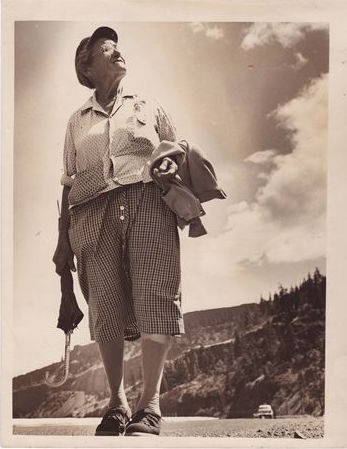Walking with Purpose
Appeared in the Tampa Bay Times, March 25, 2014
We all have to feel there is some purpose in this enterprise of life — otherwise, what’s the point?

Emma Gatewood found her purpose in walking. In her case, it didn’t manifest in furious sneaker-lapping around the local mall. (There weren’t malls in her day.) She had something more epic in mind. At 67, a fully enfranchised mother and grandmother, she decided to hike the 2,000 miles of the Appalachian Trail alone and keep it secret.
Tampa Bay Times staff writer Ben Montgomery’s new book, Grandma Gatewood’s Walk, tells the story of her 1955 journey from Georgia to Maine on the then little known trail. She was serious about the secrecy and left home without her grown children knowing. But reporters heard rumors of this grandma in sneakers and newspaper stories followed in her wake.
The first question was always “Why?” Emma Gatewood had a different answer every time she was asked. It was done on a whim, or, with her children gone, why not take a walk? Or, she told some of the reporters, it was just something she always wanted to do.
But maybe it was because the walk gave her purpose.

She came from the small town of Gallipolis, Ohio, on the Ohio River. As a teen she met a young man named P.C. Gatewood. She liked him well enough, but he wanted more and browbeat her into marriage. While they were still newlywed, P.C. began beating Emma. Somehow she stayed with him, through the births of 11 children, before finally leaving him. It took a son’s intervention to keep P.C. from killing his mother. He found his parents locked in kitchen combat, his mother with broken teeth and a fractured rib. He held his father’s arms and allowed Emma to escape and soon, after 35 years of marriage, they were divorced. Though she was due alimony, P.C. never paid.
Still, Emma reared her children and made a living. It was only in the late 1940s, after reading an article about the Appalachian Trail, that she knew what she wanted to do to take back her life and do something, finally, for herself.
Her children were out of the house, but she didn’t want to tell them about her plans, for fear they would somehow stop her. By the time she hit the trail in 1955, she was nearly 70 and had but one goal.
Montgomery’s book has a steady narrative velocity as Emma’s trek forms the trajectory of the story. But, like any good nonfiction author, he uses her trip as a window to the society and the changing culture. In her lifetime, walking had been displaced by automobile travel — even if just for a couple of blocks to go to the dime store for a can of beans. She’d seen the days of flivvers kicking up dust on flat Ohio dirt roads and now, as she hiked, the nation was birthing the Interstate Highway System with sleek, finned cars speeding through generic countryside like intercontinental missiles.
So the walking grandma, hiking the trail for her own amusement and satisfaction, set off on her mission without telling her children. It was her business, not theirs.
Of course, today’s hikers in L.L. Bean and Columbia gear and four-wheel drive footwear would scoff at her attire: worn blouses and dungarees, an unobtrusive haversack instead of an aerodynamic and many-roomed backpack, and sneakers in place of high-end hiking boots. She didn’t have much to carry, other than her memories of the life she was just now changing.
She sent her children postcards from the rural general stores where she stopped, mostly so they wouldn’t worry. She knew at such distance she was safe; they couldn’t find her and dissuade her from her mission.
But reporters did track her down after hearing talk. Though sharing her story cost her the solitude she sought on the trail, she politely answered their “why” question. It’s a lark, she said on one occasion. I got to the point where I had time, she said to another writer.
As she walked, she fought fatigue, rain, strangers, hunger and fear. She found beauty, friendships and a freedom she came to cherish. She learned as much about other people as she did about nature. She came across a group of hikers who were brought on the trail by a counselor, trying to bring two Harlem street gangs together. She saw, briefly, into lives she could never before imagine.
As she reached New England, she was faced with the remnants of two deadly hurricanes that made lakes and rivers swell (she could not swim), but finally, she made it to the end of the trail, at Mount Katahdin, Maine. From its peak, she sang America the Beautiful.
By the time she reached the peak, she was a media celebrity, soon to appear on The Today Show and You Bet Your Life with Groucho Marx. And the 1955 trip was just the first adventure of her new life. The whole saga of Grandma Gatewood, from her years in an abusive marriage to her triumph as a hiking superstar, is a great story, beautifully told.
As we follow her steps, Montgomery tells the parallel journeys of her life and of the country’s evolution from an Arrow Collar world to the teenage culture emerging in the late 1950s. We see also changes in the roles of women, and Emma Gatewood becomes a harbinger of that evolution. She no longer did what others told her to do. She did what she wanted to do — and she did it pretty up-and-walking good.
William McKeen is the chairman of the department of journalism at Boston University and the author of “Mile Marker Zero” and other books.
